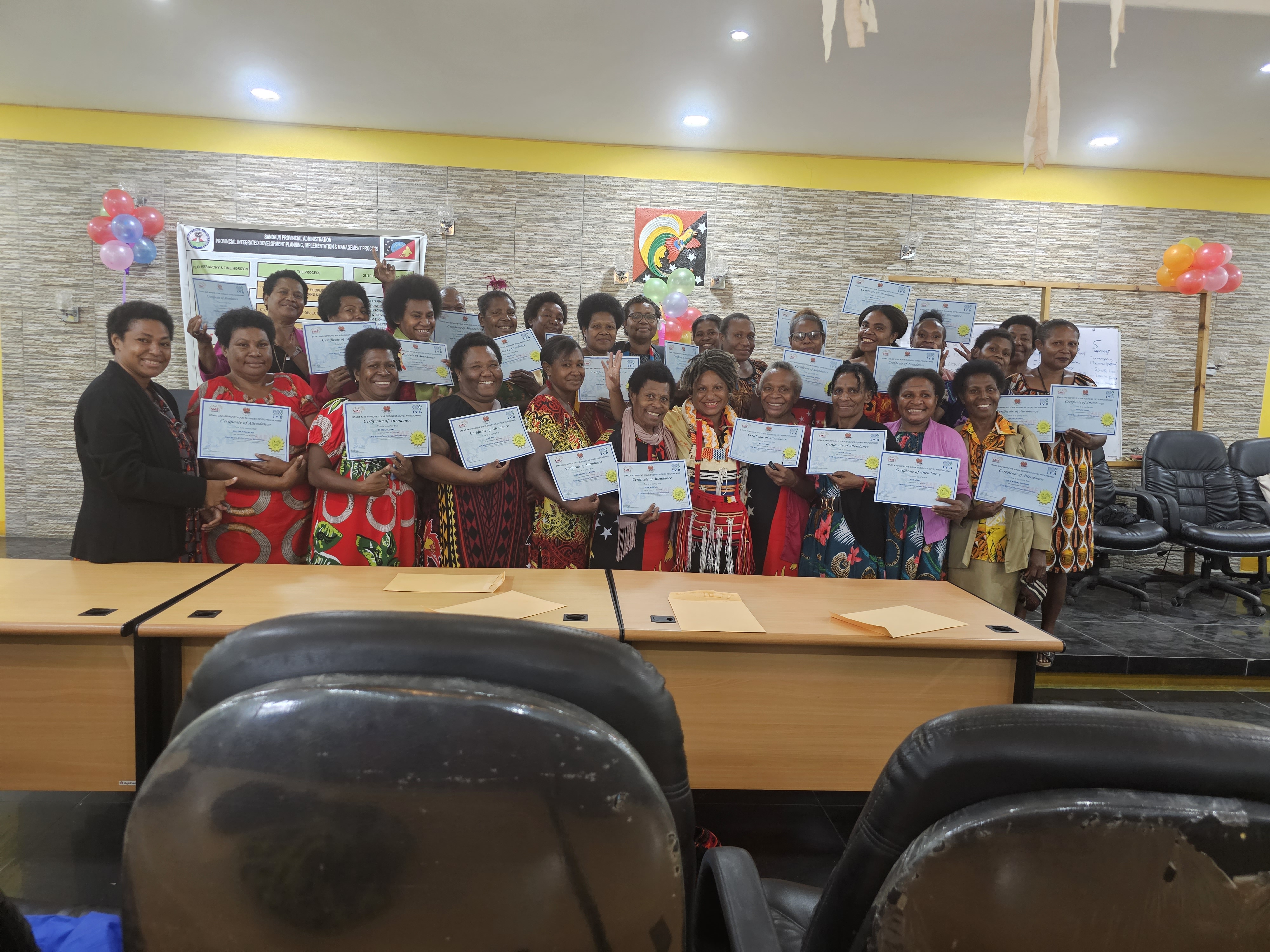
A team of WLI alumni has successfully launched a 10-day business training initiative aimed at empowering women entrepreneurs and their families in Vanimo Township, Papua New Guinea (PNG).
Supported through the Leadership Fund, the initiative supports women who produce and sell organic oils for health and cosmetic use by equipping them with the skills and resources to grow their small and medium enterprises (SMEs) strategically and sustainably.
Led by WLI alumni Diana Guria (Port Moresby), Erita Yawi (Melbourne), and Kurande Kupeng (Vanimo), the initiative was delivered in partnership with SME Corporation PNG and the Vanimo-Green District Community Development Division.
Developed by Diana, Erita and Kurande, who bring combined expertise in economic development, education, and pharmacy, the training provided hands-on learning and access to key business development tools for 18 women entrepreneurs.
On seeing the positive economic impact the project has made, project lead Kurande expressed “heartfelt appreciation to the Australian Government and the Women Leading and Influencing Committee for making this training possible".
The WLI alumni team also expressed its sincere gratitude to the SME Corporation, including staff and Managing Director Petrus Ralda, for approving and supporting the training, and the Vanimo-Green District Community Development Division for providing essential training and logistical support.
Addressing barriers to business growth
The training initiative is based on the Start and Improve Your Business (SIYB) model and was specifically designed by Diana, Erita, and Kurande to address the unique challenges that women in Vanimo face when trying to run their small enterprises.
According to the WLI alumni team, many of the women involved in the training have been producing and selling organic oils, such as noni oil and virgin coconut oil, for several years as both medicine and cosmetic products.
Among the participants were the owners of Rosella Organic Noni Oil, Awa Organics Pawpaw Oil, Memo Organic Moringa Oil, Ropheka's Virgin Herbal Oil, Nera Soursop Oil, and Wiplisi Herbal Soap.
However, sustainability and growth of these enterprises have been limited by a lack of business knowledge, unaffordable packaging materials, and the absence of consistent branding and product labelling.
Building capacity through training and tools
To overcome these barriers to business growth, the training initiative followed a structured approach that was also realistic and sustainable to implement for the participating women.
First, a nine-day SIYB training course equipped the women and their households with critical business information and entrepreneurial skills. This education enabled participants to begin formalising their own businesses with increased confidence and strategic direction.
To support the marketing and professional presentation of their products, participants received plastic packaging bottles and custom-designed labels for six different types of organic oils.
Additionally, tables and chairs were provided to boost product display and increase comfort for sellers.
Kurande explained, “These materials not only enhance the products’ visual appeal but are expected to increase public interest and consumer engagement, ultimately helping to grow demand and revenue.”

Economic and social impacts on women and families
According to Kurande, the training has already made a huge impact on the participating women who have now established daily business transaction records and marketing, income, expense, and cash flow plans for their enterprises.
“The women reported that they now feel empowered to start and expand their organic oil businesses, with the additional income allowing them to better support their families,” she explained.
According to Kurande, earnings from these businesses will contribute to meeting daily living expenses, funding children’s education, covering medical costs, and even offering financial assistance to others in their communities.
“At the same time, improved packaging and branding will help sustain production efforts and attract more customers, creating the potential for greater profits and future business innovation,” Kurande explained.
Strengthening the local economy
The initiative has also positively impacted the broader Vanimo economy.
Local supermarkets and catering companies supplied goods for the training, while transport and accommodation providers benefited from vehicle hiring and ticket purchases.
“We also worked with a local graphic design business to produce the product labels and supply the packaging containers, reinforcing our commitment to support local businesses,” Kurande added.

Promoting traditional knowledge and health
Beyond the economic advantages, the project promotes the use of traditional, natural products with well-documented health benefits.
Kurande explained, “Noni oil is known for its antibacterial properties and is commonly used to treat minor sores, wounds, skin infections, while virgin coconut oil is widely appreciated for its moisturising effects, ability to aid hair growth, and cognitive health benefits when ingested!”
Driving development through collective leadership
Diana, Erita and Kurande’s Leadership Fund initiative is a powerful example of how WLI alumni are working together and combining skills, knowledge and networks to drive meaningful change in their communities.
“By boosting women’s entrepreneurship and linking traditional practices with modern business skills, the project contributes to inclusive economic growth and community wellbeing in PNG,” Kurande reflected.
***
Participants and alumni of the Women's Developmental Leadership Program like Diana, Erita and Kurande are eligible to apply for funding to develop and implement real-world leadership projects through the WLI Leadership Fund.
